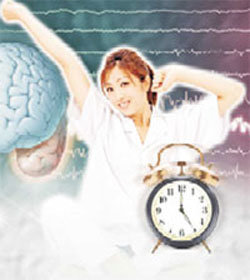Dont Force Yourself to Wake Up Too Early in the Morning
Dont Force Yourself to Wake Up Too Early in the Morning
Posted February. 08, 2004 23:00,

-Light, Body time, and Body
The body tells time through a master clockthe suprachiasmatic nucleuswhich is a small cluster of neurons located in hypothalamus, a gland in the brain. The master clock takes its cues from optic nerves in the retina that respond to levels of light. Even though people close their eyes, however, light still can reach retina by ultraviolet rays passed through the skin.
The bodys inner clock orders each organ in the body to wake up while there is light, and to sleep when it gets dark. Then, each organ secretes hormones and regulates body temperature and sleep rhythm in accordance with the orders.
It is a lot easier to wake up early in the morning during summer than during winter. This is a natural phenomenon reflecting harmonious operations of light, the bodys inner clock, and the body.
Our body secretes Melatonin while night falls. Growth hormones and various immune substances are secreted while we are sleeping. It is said that the secretion of Melatonin is the most active before 3:00 a.m. while that of growth hormones is between 10:00 p.m. and 2:00 a.m. However, it is nothing important since everybody has a different vital rhythm and those hormones are secreted whenever there is no light or people fall asleep.
When people fall into a deep sleep, the brain takes a rest and consumes less energy. As a result of that, the metabolic rate and the body temperature go down.
Now it is time to wake up. Sunlight reaches a body. The internal clock prepares a body to wake up one or two hours before we actually do wake up by secreting Cortisol, a kind of hormone, to increase blood sugar and by dissolving sebaceous acid to produce energy. The body temperature rises as the metabolic rate goes up.
-Refutation against the morning-type person
It is a predominant idea that the morning-type person is not desirable in medical terms, at least since they wake the body up forcibly when the body does not obtain enough light.
What is the bodys condition like at 5:00 a.m. when it is still dark but electric lights are on? The secretion of Melatonin suddenly drops as the body receives light, but there is not enough light to fully operate the body since the inner clock does not have enough time to prepare for the wakeup by secreting Cortisol. Since the secretion of Cortisol is not enough, the body cannot work properly, leaving the temperature low.
In other words, the body still sleeps even though consciousness wakes it up. If people try to take exercise during this time, it means they abuse their bodies. To wake up before 5:00 a.m. during winter when night is long should be bad for the body. Wake up at least after 6:00 a.m. when there is at least dim light. If you still hope to be a morning-type person, prepare a lamp that turns itself on automatically 30 minutes or one hour before you wake up to provide the body with light.
-Adapt yourself to Mother Nature
It is not difficult to change a living pattern from morning style to night style, while the vice versa is not the case. Why?
Usually the vital rhythm changes in a 24.5-hour cycle even though it slightly varies. However, Mother Nature changes in sharp 24-hour cycles, meaning people have adapted themselves to nature by making up for 0.5 hours everyday.
If you wake up earlier than you are supposed to, it contrasts with the order of nature. If you wake up more than two hours earlier than you should, in particular, it could trigger a variety of side effects such as headache or a sense of fatigue.
It also explains why people easily overcome time lag when they go to the U.S. rather than when they return back home. Lets assume you visit a place that is three hours ahead. Then the body should overcome 3.5 hours time lag, and 2.5 hours when returning.
What if there is no light? Then the body follows its own vital rhythm rather than the order of nature, so it can discern night from morning by using its inner clock, even though there is no light.
corekim@donga.com







